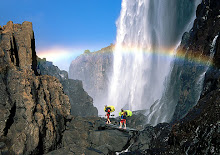Out of breath and sweating in the waiting area for South Africa Airways at Lusaka International Airport, I thought about how my subconscious defense mechanism against teary-eyed goodbyes is packing and leaving for the airport at the last possible minute. This way – I am so overwhelmingly stressed about missing my flight that I do not realize I am actually leaving.
In the case of departing from Zambia, I decided that I needed to leave for the airport at 11am, which to me meant putting off packing until the morning of. After a couple of glasses of wine with friends the night before, I had a later start than expected the following morning. Then I quickly learned the 9 hand-woven baskets I bought were not going to fit in my carry-on bag and I needed to get something to transport them in. I decided I would run to the market and get one of the plastic carriers that all the Zambians use. Most of them are decorated with Winnie-the-Pooh or Disney characters. However, I did see one with the Zambian flag on a previous visit and was hoping to find that one. Although, the thought of showing up in Boston, with a huge pink bag with Winnie-the-Pooh painted across the front was also appealing.
The usual fan club cheered me on as passed them running to Kamwala. Several stall owners were very willing to help me find the Zambia bag as I reached the market. However, I was down to my last kwachas and refused to pay more than 10 pin ($2) for the bag. Musungu price is always quite a big higher – especially for something that could be considered a souvenir. My helpers were quickly able to find a bag, but would not go lower than 20 pin and claimed no one would. I turned down the offer and was about to go buy Pooh, which was selling for 6 pin, when I decided that I might be able to negotiate better if I tried on my own. I ditched my helpers and took off, weaving through the many aisles of the market. I found the bag and used my hard-earned skills after three months in Zam to negotiate the right price . As I sprinted out of the market, now running quite late, I shouted to the helpers, “I got it for ten pin…hahahaha”. They shook their heads and laughed. I could hear murmurs of ‘what did she say’ and then someone mimicking my response, even down to the accent.
The next hour was a whirlwind of making cds for the staff people at the backpackers, shoving what I could into my backpack and giving away the rest. I may have learned to negotiate in the last three months, but I still had learned African time. My friends were due to pick me up at 11am and of course did not show up until 11:30. How could I have forgotten that you have to tell someone to be there at least a half hour before you need to leave, if you want to leave on time? Then we stopped at the bank and for gas. As we entered the midday traffic, I was in total panic mode. I heard, “Stop chewing your nails off” from the back seat and turned to see my friend sipping on a warm beer, probably left from the night before, and smiling, not a care in the world.
When I arrived at airport, I needed to drop off my camera at the Proflight office. I was giving the camera to my friend in Mfuwe and needed to send it through a flight attendant he knew. The airport was very confusing and I left my bags near the security area, as I could run around in search of the office. I found the office, stuffed the camera in an envelope and then was off again. But by the time I returned to my bags, there were three security guards staring at them. “They are mine….they are mine”, I shouted as I ran towards them. The one guard replied, “Madam you cannot leave your luggage alone”. I smiled and said, “Oh I am sorry, I didn’t know that”, the whole time thinking about the States and the constant code orange warnings that are announced every 15 minutes in the airport.
After making it through security and immigration, I was able to make all the last minute phone calls to say goodbye. I was feeling very proud that I survived without crying. Just as we were boarding, a final text message came through from a coordinator that I spent a week driving from clinic to clinic on the worst roads in Zambia… ‘I will miss you my daughter. Safe journey’. And suddenly, I was no longer so brave.






























